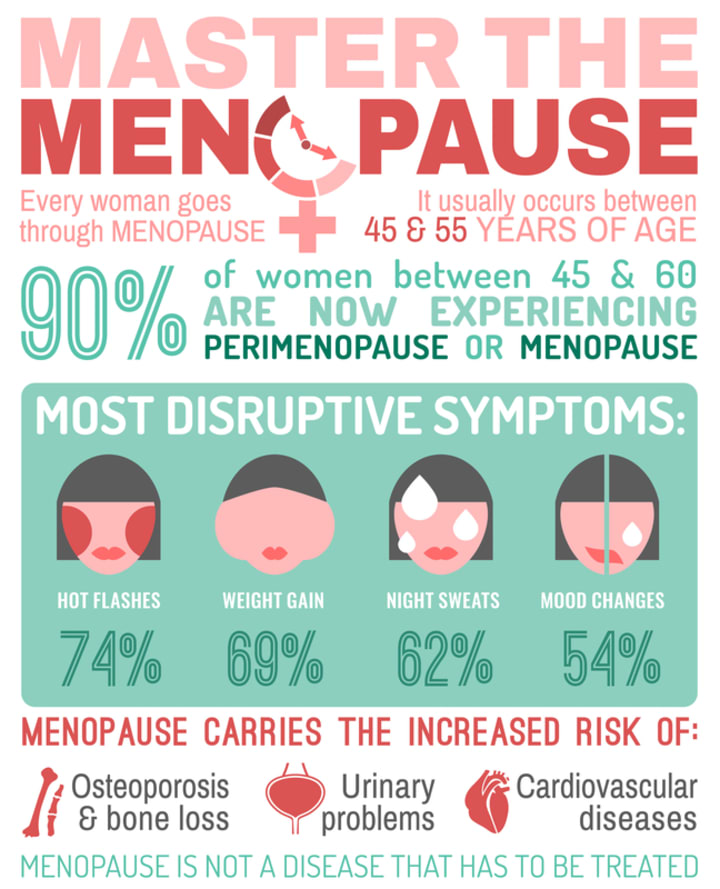A Woman's Guide to Perimenopause
How to Embrace Middle Age

I recently turned 49 and thought to myself, wow how time has flown by. It really does just seem like yesterday that I was in my 20’s and raising my children. Now my children all are adults and this past September I became a grandma for the very first time. As much as I love my grandson and as much as I have been anticipating my children starting their own families, there has also been a certain level of personal anxiety with the changes going on in my life.
I am in a period of life which is difficult for so very many women. I am not young anymore yet I am also not old. I am in the middle which is a transitioning time on so many levels. Middle age for women can be a confusing time. Emotions run the roller coaster ride of the extreme highs feeling energized and unstoppable to the rampant lows of depression and insecurity. We begin to notice changes in our physical appearance not all of which are a welcoming experience, I might add, and sometimes it just does not seem quite rational. Yet life goes on and we try to reason with these changes coping the best way we know how.
Most of my forties have been enjoyable. I have always been physically active and have remained in good shape over the years. I have had minimal grey hair which began in my thirties but being a natural blonde it blended nicely and was not terribly noticeable. Sure I have developed a few fine lines around my eyes and on my forehead but nothing outrageous so no complaints. The last year, however, has been a bit different. I have been experiencing some changes and when I turned 49 this past November, my birthday came with some apprehension. I am going through a time in life for a woman that really is not talked about enough. While I had a wealth of information given to me prior to my first period, I have not received the same consideration as to where I am now; perimenopause.
Perimenopause, meaning"around menopause", also called menopausal transition, is a time when the ovaries gradually slows down its estrogen production until menopause. By definition, menopause is reached only when a woman’s period is absent for 12 consecutive months. Sometimes the terms perimenopause and premenopause are used interchangeably but they do not mean the same thing. Premenopause is the time before menopause when periods are consistent without noticeable hormonal changes. Perimenopause is the transition time where periods are erratic with hormonal fluctuations leading up to the final period; menopause.
Most women can expect the onset of perimenopause at some point in their forties but there are some women who are younger (30’s) and others older (50’s). The average age for an American woman to reach menopause is 52. Globally the age range is 45 to 55 for menopause with symptoms of perimenopause lasting an average of 4 to 8 years beforehand. Both my gynecologist and further research have confirmed that symptoms can even last 10 to 12 years.. With the average age of a girl’s first period being 12, and menopause 52, an average of about 3500 days or 10 years of a woman’s life is spent menstruating. Considering this information, it really is no wonder why transitioning can be such a difficult emotional experience.
Perimenopause Symptoms
Below is a list of symptoms associated with perimenopause. These will vary from woman to woman and, of course, not every symptom will be felt.
1. Irregular periods. One of the first clues that a woman is in perimenopause is the change in her monthly cycle. Periods can become erratic and switch up month to month. They can become lighter and shorter to heavier and longer. Sometimes a period will skip a month here and there. Other times it is possible to be smacked with 2 cycles in one month.
2. Sleep problems and night sweats. Sometimes getting a complete night’s rest will be challenging. It can vary from tossing and turning feeling restless, and or waking up drenched from sweating as the body’s estrogen levels rise and fall unevenly.
3. Mood swings. Irritability and increased risk of depression. Mood changes can be caused by sleep disruption from hot flashes.
4. Vaginal and bladder problems. Vaginal tissues lose lubrication and elasticity as estrogen levels diminish. Low estrogen levels also leave women vulnerable to urinary tract and vaginal infections. Loss of tissue tone can contribute to urinary incontinence. Sometimes urine will leak when coughing or sneezing. Constipation and hemorrhoids are other common concerns.
5. Sexual libido. Perimenopause can cause a change in sexual arousal or desire.
6. Weight gain. As woman reach middle age it is not uncommon to experience weight gain especially to the hip, thighs and mid-section
7.Loss of bone. Declining estrogen levels also puts a woman more at risk of developing osteoporosis, a disease that causes fragile bones.
8. Changing cholesterol levels. Declining estrogen levels can lead to changes in blood cholesterol. Low density lipoprotein (LDL) increases which is the" bad" cholesterol which contributes to an increased risk of heart disease.
9. Headaches. Again with estrogen levels declining, some women will get headaches or even migraines that they previously did not experience.
10. Hot flashes. These are brief sensations of heat and are not the same for everyone. Some women only have a mild sensation and others feel a full on inferno. Aside from heat, flashes can come with a red, flushed face, sweating, and a chilled feeling after the heat.
The above list is not all inclusive. Other symptoms are thinning hair, hair loss, difficulty concentrating, and temporary memory lapses, sore breasts, increased P.M.S, dry, thinning skin, cramps, body aches, and decreased fertility. An important thing to keep in mind is that although estrogen levels are falling, women can still become pregnant during perimenopause and protected sex is necessary to avoid a surprise unwanted pregnancy.
Here is my personal cycle for the last year using the Flo App. As you can see my cycle has been a bit all over the place. Based on data from the last year my cycle averages at 32 days. Scrolling down, you will notice I had shorter cycles of 19 days then the cycles got farther apart, one point at 45 days then a big spacing at 70 days, my largest gap. I missed 2 periods during this phase and even though a cycle of 60 days can be an indicator of closing in on menopause, my next period came back with vengeance lasting for 10 days. Again, menopause is only defined after 12 consecutive months without a period. Most of my periods this past year have been light and lasted for 5 days. I only have had 2 heavier ones with the heaviest one being the most recent. Before this year I always had heavy bleeding and very regular cycles. My cycle is an example of what women go through during perimenopause.


How to cope with perimenopause symptoms
Perimenopause is a normal part of a woman’s aging process and should not be treated like a" disease." There are, however, ways to alleviate accompanying uneasiness making the transition more comfortable.
1. Maintain a healthy lifestyle. Limit alcohol, sugar and caffeine intake. Also cut back on the salt. If you smoke perhaps now is the time to kick the habit.
2. Better diet. Eat a healthy low fat, high fiber diet rich in fruits, vegetables and whole grains. Be sure to include calcium rich foods and drink plenty of water.
3. Add vitamin D. Talk to your doctor about adding vitamin D. Estrogen increases the enzyme responsible for activating vitamin D. Declining levels of estrogen during menopause transition can lead to vitamin D deficiency. In studies, vitamin D has been linked to preventing heart disease, cancer, Osteoporosis and weight gain.
4. Over the counter vaginal lubricants. Products like KY Jelly and Astroglide can help alleviate the discomfort of vaginal dryness. Be sure to use water based products without Glycerin which can cause burning and irritation to people who are sensitive to this ingredient.
5. Wear a sports bra. Swollen tender breasts are really uncomfortable. Some women will notice an increase in breast size. A comfortable well-fitting bra is important. Wearing a sports bra to bed at night can also make for a better night’s rest.
6. Exercise. I recommend 30 minutes a day of some kind of exercise. Walking and aerobics are both good examples. It is important to incorporate some kind of cardio and strength building. I switch up my routine throughout the week and use hand weights to help with upper body strength. Yoga is one of my favorite ways to keep my core strong. Try to not exercise right before bed, however, as this may interfere with sleep.
7. Stress relief. Meditation and deep breathing exercises are excellent ways to clear your mind. I find them a helpful way to deal with hot flashes and times when concentration is proving bothersome to me. This is also a good technique for coping with anxiety.
8. Learn something new. Pick up a new hobby, learn a craft or take a class. The point here is to add something new into your life that elevates your mood. This can be a helpful way in combating depression.

I have chosen a pretty natural way to deal with my perimenopause symptoms. I do have trouble with sleep and hot flashes but not on a regular basis. My cycles are irregular which can be annoying and I do suffer bouts of depression and anxiety which I manage with exercise and meditation. Some women will have a much more difficult time than myself and will need to talk to their Gynecologist. This is nothing to be ashamed of and there are treatment options for those who experience the more troubling symptoms. Systemic estrogen therapy can come in different forms; pill, skin patch, gel or cream. This therapy is used to help alleviate hot flashes and night sweats and can also help prevent bone loss. Sometimes antidepressants- selective serotonin reuptake inhibitors (SSRI’s) are prescribed for reducing hot flashes. This may be especially helpful to women who cannot take estrogen therapy due to health reasons. Gabapentin, a medication known to treat seizures, can be prescribed for migraine sufferers and reducing hot flashes. I am not a medical professional and I do highly advise speaking to your doctor if having a difficult time with perimenopause. My information here is a combination of personal experience and 2 years of research.
Predicting age of menopause
A woman’s age of menopause is determined mostly by genetics. Having knowledge of family history can give a basic idea of when menopause might occur. I was told by my Gynecologist to loosely base my prediction off my Mother’s age onset of menopause.
Early Menopause and possible causes
As most women will experience transition between the ages of 45 and 55, menopause before age 45 is considered early onset. Menopause before the age of 40 is thought to be premature. It is always best to discuss concerns with your physician but here are a few reasons why menopausal transition can occur early.
1. Smoking is linked to early menopause as well as a load of other health related issues; just another reason to quit.
2. Treatments for cancer
3. Surgeries like Hysterectomy (removal of the uterus) and Oophorectomy (removal of one or both ovaries).
How Culture can affect menopausal transition
Western civilization often associates beauty with youth leaving the older women out feeling useless or irrelevant. This has a common psychological impact among women here that is not so prevalent in other cultures. These stressors can influence the physical symptoms that are also seen here yet not reported as widely in countries abroad. I feel that is important to recognize beauty and vitality in women across all generations.
In societies where age is honored and older women are seen as wiser, menopausal symptoms are less bothersome. Despite the fact that women across the globe experience many of the same transitional signs, lifestyle, diet and cultural expectations of menopause create a different impact on how a woman perceives her change. In countries like India where women have a low status or are not allowed to show sexuality, menopause provides freedom to go out in public and do things usually forbidden to women. Both Mayan and Greek women report better sexual relationships with their husbands after menopause. Mayan women marry young and do not practice birth control. Most of their reproductive years are spent either lactating or pregnant and pregnancy is viewed as dangerous and stressful. Menopause offers them freedom from restrictions and pregnancy. Post menopause frees the Greek woman from taboos allowing them to participate in church activities as they are no longer seen as a threat to the community.
I think it is vital to consider not only hormonal changes as the determining factors of how menopausal transition will be experienced. I do believe the culture that a woman finds her in has a major impact in her mid-life transition. I have done extensive research on this topic over the last two years and feel that western women should embrace their changes in a celebratory manner. Aging is inevitable and perimenopause is a natural part of a woman’s progression to a new phase in life. I understand firsthand that this can be an emotional time and I do find myself with difficult days but the important fact to take away here is that we are entering a new time in our lives. I suppose to think of it as" leveling up" is appropriate as there will no longer be the annoying monthly periods. That in itself is freedom and I am actually beginning to look forward to it. Women everywhere should feel important and empowered as we are strong and beautiful at every age.
About the Creator
Marilyn Glover
7x Medium boosted poet, editor, and Reiki Master who is at her best when in nature. Creating to boost humanity while often not coloring within the lines. Follow me at: https://gmarilyn009.medium.com/






Comments
There are no comments for this story
Be the first to respond and start the conversation.